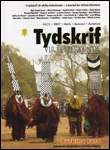The integration of creative oral forms and techniques in Fidèle Padwindbé Rouamba's Pouvoir de plume
DOI:
https://doi.org/10.4314/tvl.v44i1.29779Keywords:
Burkinabè novel, oral tradition, proverbs, tales, jesting allianceAbstract
Fidèle Padwindbé Rouamba's novel, Pouvoir de plume ("Pen power", 2003) summarises the life of a journalist, Gouma Tansoba, alias Gilbert Torro. The principal narrator is Jean de Dieu, a friend of the journalist. The journalist recorded the narrative on five cassettes, which the heterodiegetic narrator has reconstituted to form a novel. The novel is also a pertinent analysis of the development problems of the democracy in the country and in Africa in general. Particularly striking is the way the author exploits the oral tradition. Thus he makes an effort to use many proverbs drawn from the Moaaga oral tradition. A folktale "Le caïman et l'homme" ("The Caiman and the man") is also included in the narrative. Moreover, in chapter nine, "Le Club" ("The Club"), the author introduces a story to illustrate the jesting alliance between the Bisa and Gourounsi. he therefore exploits, as did the Burkinabè novelists Patrick Ilboudo in Le procès du meut ("The trail of the deaf-mute") and Noaga Kollin Le retour au village ("Back to the village"), the virtues of this traditional practice, firmly established in the ethnic culture of Burkina Faso. I shall endeavour to reveal how the novelist Rouamba exploits the oral tradition in his work, in order to see how all the creative oral forms and techniques borrowed from the oral tradition act as catalysts in the production of a novel.
Downloads
References
...
Downloads
Published
Issue
Section
License
Copyright (c) 2007 Tydskrif vir Letterkunde

This work is licensed under a Creative Commons Attribution-ShareAlike 4.0 International License.


 https://orcid.org/0000-0001-6465-6584
https://orcid.org/0000-0001-6465-6584


.png)